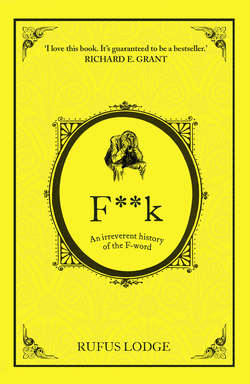Читать книгу F**k: An Irreverent History of the F-Word - Rufus Lodge - Страница 6
Origins F.U.C.K.? No!
ОглавлениеIt is true that F.U.C.K. is an abbreviation for the phrase For Unlawful Carnal Knowledge. But it is not true that this abbreviation is the source of the word ‘fuck’. Neither, for that matter, is another phrase that spells out the same unseemly word: Fornication Under Consent of the King.
Both phrases have a legal ring to them, and the hint that they might belong to bygone centuries, and so a pair of urban myths has grown up around the pair of them, in tandem. The explanations that their supporters employ are long and imaginative, but they boil down to a single, gristly core: that men in medieval authority grew so tired of writing out the phrase in question that it was abbreviated to save their time and their quills, and the condensed version survived long after the ancient civil service jargon was no longer relevant.
For Unlawful Carnal Knowledge was supposed to have been given as an explanation, in official papers and parchments, whenever a case of adultery was discovered and charged. It has even been claimed that the phrase, or its abbreviation, would be written across the stocks when a philanderer was facing the wrath of the people. Not true: adultery may indeed have been a crime in the past, but never under that name.
At the other extreme, some people were supposed to have been given a special licence to have sexual intercourse, or to produce babies: to these lucky souls, so the theory goes, was given permission for Fornication Under Consent of the King. You have to admit that this is a particularly attractive idea: it’s easy to imagine the heraldic symbols belonging to the King’s 1st Regiment of Shaggers. But, sadly, it’s another invention.
Not that this prevented the rock band Van Halen from prolonging the myth that Carnal Knowledge was the root of the illicit F-word. In a burst of adolescent bravado, the band decided in 1999 to call their next album Fuck. Once they had been informed that this would prevent the record being sold at almost all retail outlets, they fell back on the old canard about the punishment of adulterers, and named their album after the phrase that spelled out F.U.C.K. Their information may have been way off beam, but not their commercial instincts, as the record reached the top of the American charts. This proved conclusively that none of the buyers at the nation’s biggest and most conservative retail chains – usually primed to slap a sales ban on anything that might corrupt the innocent masses of Middle America – was capable of recognising a blatant reference to the F-word when it was placed in front of them.
